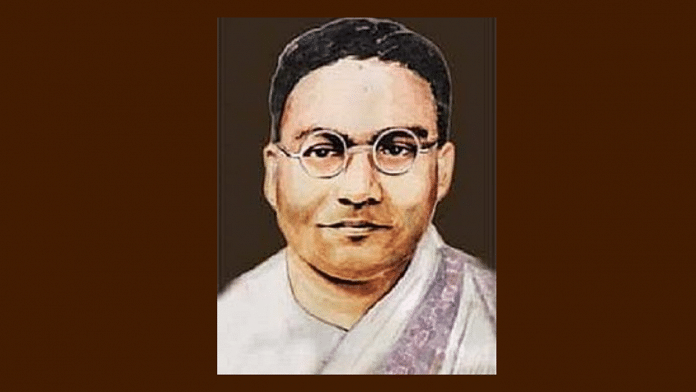That one lapse in judgement would cost Mandal not just his political career, but his place in history. When Mandal died unsung in West Bengal on 5 October 1968, aged only 64, Hindus, irrespective of caste, were under siege in East Pakistan where he was once the undisputed leader of the Dalits and where he had dreamt of Muslim-Hindu unity.
Caste warrior or career politician?
East Pakistan is now Bangladesh. But the name of the village and the district where Mandal was born on 29 January 1904 remain the same. In October 2022, I visited Moisterkandi village, which falls under the Gour Nodi sub-district in Barishal district of south-central Bangladesh, and sought out Mandal’s ancestral home.
Mantulal Mandal, the only surviving member of Mandal’s family in Bangladesh, showed me four bamboo poles planted in a vegetable garden outside a one-storey brick house. “That ancestral house was not preserved. This vegetable garden has taken its place,” Mantulal Mandal, the grandson of Jogendranath Mandal’s elder brother, told me.
He had taken me inside the brick house. It is a memorial to Jogendranath Mandal. Inside, there is an old wooden table, plastic chairs, and posters of Jogendranath Mandal hanging from the wall.
Mantulal had told me he is proud of his granduncle, just like the village is, even though much of the rest of Bangladesh seemed to have forgotten its illustrious son. The village has a committee in memory of Jogendranath Mandal that organises kabigaan or folk performances on his birth and death anniversaries.
But why is there not a single statue of the man in the village, I had wondered, or the ancestral house preserved in memory of one of Barishal’s most illustrious sons.
It was from this Barishal district in pre-independence, undivided Bengal that Mandal had started his political journey, mobilising Bengali Dalits and becoming their undisputed leader.
In the Bengal Legislative Assembly elections of 1937, Mandal won from the Bakerganj North-East General Rural constituency as an independent candidate. He established the Bengal branch of the All India Scheduled Castes Federation, a Dalit organisation led by Ambedkar.
Ambedkar and Mandal became icons of the Dalit community. Then, Mandal made a fatal mistake.
“Jogen Mandal thought instead of opting for India after the Partition it would be better for the Dalits to remain in Pakistan as Muslims do not believe in untouchability or caste system,” political commentator Abdul Mannan wrote in Daily Sun.
Mandal allied himself with the Muslim League in Bengal and also told Dalits to side with the Jinnah-led party. “One of the most important roles he played was during the election of Sylhet referendum in 1947. The Sylhet district was to vote in a plebiscite to join either Pakistan or remain in Assam. The Hindus and the Muslims of the district equalled each other in terms of population. However, there were a large number of Dalits (mainly in tea gardens) whose vote could sway the poll to either side,” Mannan wrote.
On Jinnah’s instruction, Mandal campaigned among Dalits to vote to join Pakistan—which they did—and subsequently, Sylhet became part of East Bengal (later East Pakistan). During Partition, as communal violence broke out, the first flush of Hindu refugees who crossed over from East Pakistan to West Bengal were mostly upper–caste Hindus. Most of the Dalits listened to Mandal’s advice, and stayed put in East Pakistan hoping for better days. He was rewarded by Jinnah who made him Pakistan’s first law and labour minister.
By 1950, Mandal’s dreams of Dalit-Muslim brotherhood were dashed. He realised, a little too late perhaps, that in the newly formed Pakistan, it did not matter if you were a Dalit or a caste Hindu. Being Hindu was enough to get you maimed, raped, killed, or forcibly converted. Mandal’s pleas for the protection of his people fell on deaf ears.
On 8 October 1950, Mandal wrote a resignation letter to then-Pakistan prime minister Liaquat Ali Khan.
“Those Hindus who will continue to stay I am afraid, by gradual stages and in a planned manner be either converted to Islam or completely exterminated. It is really amazing that a man of your education, culture and experience should be an exponent of a doctrine fraught with so great a danger to humanity and subversive of all principles of equality and good sense. I may tell you and your fellow workers that Hindus will allow themselves, whatever the threat or temptation, to be treated as Zimmies in the land of their birth,” his letter read.
“Today they may, as indeed many of them have already done, abandon their hearths and homes in sorrow but in panic. When I am convinced that my continuance in office in the Pakistan Central Government is not of any help to Hindus I should not with a clear conscience, create the false impression in the minds of the Hindus of Pakistan and peoples abroad that Hindus can live there with honour and with a sense of security in respect of their life, property and religion. This is about Hindus,” Mandal wrote.
Ayan Guha, a British Academy International Fellow, University of Sussex, and an authority on caste in Bengal, told ThePrint that the kinder perspectives on Mandal rationalises his actions and political fluidity as efforts to protect the interests of Dalits. “But there is another perspective that looks at his actions as politically calculative moves to gain influence and power. Possibly, the truth lies somewhere in the middle,” Guha said.
But some modern-day Bangladeshi Hindu rights activists like Jayanta Karmakar see Mandal as a villain and attribute the plight of Bangladeshi Hindus today to Mandal’s inability to see the obvious. “His guru Ambedkar was a far more pragmatic man and did not side with Jinnah, knowing that any hope for unity between Dalits and Muslims would be dashed eventually. But Mandal stopped Dalits from crossing borders in 1947 and today we are stuck in Bangladesh,” Karmakar told ThePrint.
He said what rankles Dalits on the other side of the border the most is that Mandal relocated to West Bengal, leaving them all behind.
Also read: Amartya Sen read Bangladesh wrong. And his faith in Yunus to revive the country is misplaced
Jogen Ali Mollah in Bengal
In West Bengal, Mandal wanted to steer the refugee movement and give a new direction to his political career. The United Central Refugee Council, founded in 1950, had taken up the fight for East Pakistan’s Hindu refugees who were pouring into West Bengal. Mandal found that more than helping the refugees, the organisation was politically benefitting the Communist Party of India in its battle against the ruling Congress.
Mandal also believed the council spoke more for caste Hindus than the casteless. But who would believe a man who had once sided with Jinnah and now left hapless lower-caste Hindus to fend for themselves in East Pakistan, even as he escaped to West Bengal himself. His detractors had begun calling him Jogen Ali Mollah, mocking his affinity to Pakistan.
Oral historian Avishek Biswas told ThePrint that Mandal played a big role in securing Ambedkar’s election to the Constituent Assembly from Bengal in 1946, when the latter faced challenges in securing a seat from Bombay. “Those who diss Mandal today forget what he did for Ambedkar in 1946, and his contributions in mobilising Dalits in pre-Partition Bengal. Sadly, they only remember that he sided with Jinnah. Mandal could have been Bengal’s Ambedkar. He isn’t,” Biswas said.
From his grave, Jinnah denied Jogendranath Mandal his place in history.
Deep Halder is an author and a contributing editor at ThePrint. He tweets @deepscribble. Views are personal.
This article is part of Dalit History Month series.
(Edited by Aamaan Alam Khan)
var ytflag = 0;
var myListener = function() {
document.removeEventListener(‘mousemove’, myListener, false);
lazyloadmyframes();
};
document.addEventListener(‘mousemove’, myListener, false);
window.addEventListener(‘scroll’, function() {
if (ytflag == 0) {
lazyloadmyframes();
ytflag = 1;
}
});
function lazyloadmyframes() {
var ytv = document.getElementsByClassName(“klazyiframe”);
for (var i = 0; i < ytv.length; i++) {
ytv[i].src = ytv[i].getAttribute('data-src');
}
}








